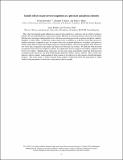Files in this item
Gender effects in perceived recognition as a physicist and physics identity
Item metadata
| dc.contributor.author | Bottomley, Ewan | |
| dc.contributor.author | Mavor, Kenneth I. | |
| dc.contributor.author | Miles, Paula J. | |
| dc.contributor.author | Kohnle, Antje | |
| dc.contributor.author | Wild, Vivienne | |
| dc.date.accessioned | 2021-11-05T10:30:02Z | |
| dc.date.available | 2021-11-05T10:30:02Z | |
| dc.date.issued | 2021-10-10 | |
| dc.identifier | 276266959 | |
| dc.identifier | e860f9c7-d82d-413f-828e-051608872f38 | |
| dc.identifier | 85124256630 | |
| dc.identifier | 000885102500008 | |
| dc.identifier.citation | Bottomley , E , Mavor , K I , Miles , P J , Kohnle , A & Wild , V 2021 , ' Gender effects in perceived recognition as a physicist and physics identity ' , Paper presented at Physics Education Research Conference 2021 , 4/08/21 - 5/08/21 pp. 51-56 . https://doi.org/10.1119/perc.2021.pr.Bottomley | en |
| dc.identifier.citation | conference | en |
| dc.identifier.other | ORCID: /0000-0003-2638-4826/work/101581361 | |
| dc.identifier.other | ORCID: /0000-0002-6220-7774/work/101581401 | |
| dc.identifier.other | ORCID: /0000-0002-3160-3889/work/101581615 | |
| dc.identifier.uri | https://hdl.handle.net/10023/24265 | |
| dc.description.abstract | This study investigated gender differences in perceived recognition as a physicist and its relation to physics identity. We surveyed 688 physics majors (228 women, 460 men) at a research-intensive university in the UK at both the lower and upper undergraduate levels with items measuring perceived recognition and physics identity. Similarly to other studies, we find that women report lower recognition as a physicist from their instructors, families and friends compared to men. In contrast, there were no gender differences in students’ perceptions of friends asking them for their advice/input in physics-related problems. Perceived recognition from instructors was lower than recognition from family and friends for both men and women. We find that both perceived recognition from instructors and physics identity are significantly lower for upper level students compared with lower level students. Multiple linear regressions for men and women individually found that both perceived recognition from instructors and from family/friends predicted students’ physics identity. These results may indicate a shift in students’ understanding of what it means to be a physicist as they progress through the degree program. The results point to further research being needed to understand better the mechanism by which students form perceptions of instructors seeing them as physics people. | |
| dc.format.extent | 5 | |
| dc.format.extent | 514350 | |
| dc.language.iso | eng | |
| dc.relation.ispartof | en | |
| dc.subject | BF Psychology | en |
| dc.subject.lcc | BF | en |
| dc.title | Gender effects in perceived recognition as a physicist and physics identity | en |
| dc.type | Conference paper | en |
| dc.contributor.institution | University of St Andrews. Centre for Higher Education Research | en |
| dc.contributor.institution | University of St Andrews. School of Psychology and Neuroscience | en |
| dc.contributor.institution | University of St Andrews. Centre for Research into Equality, Diversity & Inclusion | en |
| dc.contributor.institution | University of St Andrews. School of Physics and Astronomy | en |
| dc.identifier.doi | 10.1119/perc.2021.pr.Bottomley | |
| dc.description.status | Peer reviewed | en |
This item appears in the following Collection(s)
Items in the St Andrews Research Repository are protected by copyright, with all rights reserved, unless otherwise indicated.

